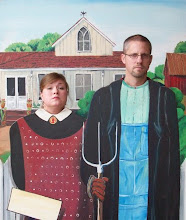The three parables in chapter 15 are very precious to me. They are given in response to the Pharisees' objection to Jesus' receiving of sinners. The first question that comes to my mind is "Why were sinners drawing near to hear Jesus?" It seems to me that the reason is that the message of Jesus was a message of hope - "Come to me, and I will forgive your sins!" Who would respond to such a call, but those who acknowledge their own sinfulness! The second question is this, "What is the source of the joy that comes in response to the lost sheep, lost coin, and prodigal son when they are all found?", and "to what is the corresponding joy in heaven referring?" The joy in the first parable is from the shepherd who found the sheep. The joy in the second parable is the woman who found the coin. The joy in the third parable is from the father who received his son back again. Many would say that the corresponding joy in heaven is from the angels, citing 15:10; however, look at vs7. It merely says that there will be joy in heaven. Also, look at vs10. It says that there is joy before the angels of God. If we take our clue from the parables just mentioned, the one represented by the shepherd, woman and father would be God! I would submit to you that the joy in heaven over one sinner that repents is the joy that comes from God Himself! How much more precious is it to know that God rejoiced over your conversion and not just the angels. Of course, I do believe that the angels rejoice as well. Why would they not? How inappropriate would it be for God to be rejoicing in heaven in the presence of the angels and yet the angels remain unmoved?!
One other thought about the closing statement of vs7. It is not as if there are people in this world that do not need to repent. God commands all men everywhere to repent (Acts 17:30). The point is that there are plenty of self-righteous people (e.g. the Pharisees) that think that they don't need to repent! Woe to those who feel that they are "good enough" to please God!
Chapter 16 closes with the story of the rich man and Lazarus. I say a "story" and not a "parable" because first of all the Bible doesn't call it a parable and second of all parables do not refer to people by proper names. So, we can take this account of the rich man and Lazarus to be an actual event in history. Therefore, hell is a real place and heaven is real as well. Once you are in one place, there is no getting to the other (vs26). There is torment in hell and comfort in heaven (vs25). These are all significant truths for us to consider, but the most important part about this story is Abraham's answer to the rich man's request that Lazarus go back and warn the man's family. Abraham's answer is not just "no." He says that there is something sufficient to warn the people of this life to flee the judgment of the life to come that is more powerful than if a dead man were raised to warn them. That "thing" is the Word of God, here referred to as "Moses and the Prophets." The Word of God is sufficient for many things, but the most important of all is its power to convince men of their sin and show them the way of salvation! This is what we must hold up to sinners as we plead with them to repent and come to Jesus Christ!
Friday, October 2, 2009
Subscribe to:
Post Comments (Atom)

No comments:
Post a Comment